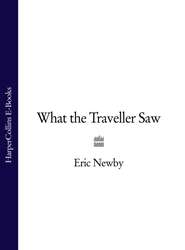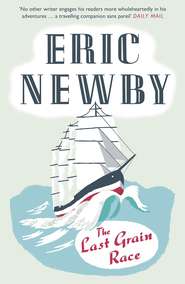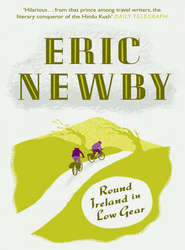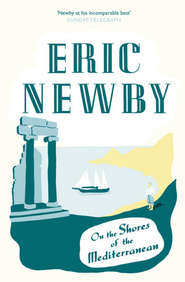По всем вопросам обращайтесь на: info@litportal.ru
(©) 2003-2024.
✖
A Merry Dance Around the World With Eric Newby
Автор
Год написания книги
2019
Настройки чтения
Размер шрифта
Высота строк
Поля
In its chapels, halls and passages and on its circuit walks, sheep and goats wandered. It was cool up there and we built a great fire in one of the rather smelly halls. We thought the flickering of the light on the walls and the giant shadows highly romantic until we were infested by bats, attracted by the flames, which were so numerous that they eventually forced us to retreat to one of the roofless towers. There we passed the rest of the night free of them and the rotten-chocolate smell of their excrement.
We used to start work as soon as it was light, then rest in the heat of the day. We had soon lost most of our external military characteristics. Down on the shore, under the mountains, it was much too hot to wear anything but shorts and sandals and straw hats, and the sergeant acquired a long, lean hunting dog. We were dressed like this, the sergeant with his dog on a rope leash and carrying the Sten gun, the others armed with pistols and the long canes we used for taking soundings, when one morning the Duke of Gloucester, on a tour of inspection with a convoy of military big-wigs, looked down incredulously on us from his motor car as he whizzed past, covering us with dust.
During the hot, midday hours we used to sprawl in the shelter of an ilex or an over-size boxwood tree in which the coast abounded, more often than not surrounded by ruins – we soon learned that the ancients had already identified for us all the best landing places, however insignificant. There we reclined drinking wine, eating chickens we had bought from some cook shop, carving up big loaves of bread that looked as if they might have been baked by Phoenicians, dreamily listening to the droning of unidentifiable insects, the shrill screaming of the cicadas or the endless din set up by the frogs in some nearby marsh, and sniffing the pungent smelly maquis.
We worked at Ibn Hani, a place lost among olive groves, where there were the remains of a temple and an amphitheatre, and at Ras Shamrah, the site of Ugarit, a famous city of the Phoenicians but with origins far older, going back to 5000 BC, perhaps further. Much of Ugarit was buried under Ras Shamrah, but a French expedition had continued to excavate it until the war put an end to their labours. Now it was completely unprotected – there were no custodians to harass us – and unvisited. In places one could look down, strata on strata, fifty feet or so, through different levels of civilization to where people had lived who had worshipped Baal, the God of Rain, and Dagon, to levels at which the inhabitants had had relations with Egypt and Crete in the seventeenth and eighteenth centuries before Christ; to where later, in the fifteenth and fourteenth centuries, they had installed sanitation and constructed burial vaults; and to the level where, in the thirteenth century, the Mycenaeans had lived in it until its final extinction by some peoples of the sea in the twelfth century. It was here at Ras Shamrah that, scrabbling among the rubble in the fearful afternoon heat with my stick, keeping watch while the others slept, I discovered two exquisite miniature bronze bulls which subsequently reached England, only to be stolen from over a fireplace in a drawing-room while we were having a Christmas party.
On Saturday mornings we used to return to Beirut in pursuit of pleasures to which the ancients themselves were no strangers. Together with the officer who, like me, had been attracted by two Greek girls from Athens, I used to put up at the St George Hotel, where they continued to stay. We saw nothing of the city. Once or twice we all four lunched together at a restaurant perched on the cliff overlooking some impressive offshore stacks called the Grottes des Pigeons. Another time we went to the mountains and stayed in a village. For the rest of the time we sunbathed with them on the hotel beach, swam, made love, drank, sunbathed, swam, made love, ordered up club sandwiches and so on until at dawn on Monday morning, I used to board our vehicle to cries of ‘Oh, do hurry up, sir!’ and roar away for Ras Shamrah, Tartus or wherever we happened to be making our maps. We were completely exhausted, unlike our partners who, unknown to us, had other bedfellows of a more senior, stay-at-home kind during the week. We had met our match, we both agreed, in these girls, who, for us at least, did everything for love.
After this extraordinary, almost dream-like interlude in our military careers, we all returned to the fields of action from which that fickle goddess Fortune had fancifully removed us. However, before doing so, we delivered to the DCO by way of the NOIC the final instalments of our labours which, altogether, were of almost encyclopaedic proportions.
This mass of material, flavoured with a surprising amount of newly-acquired culture – the reports of the cultivated and gallant sergeant made particularly good reading – had an extremely short life. Consigned to the most secret archives, the whole lot was used a few months after we delivered the final sections to stoke the already huge funeral pyres of documents that were on no account to fall into enemy hands – although what use they would be to the Germans with Egypt already in their hands it was difficult to imagine – pyres which created a dense pall of smoke over Cairo in that summer of 1942, when it seemed more than probable that Rommel would arrive in the city in person.
OPERATION WHYNOT
We were captured off the east coast of Sicily on the morning of the twelfth of August, 1942, about four miles out in the Bay of Catania. It was a beautiful morning. As the sun rose I could see Etna, a truncated cone with a plume of smoke over it like the quill of a pen stuck in a pewter inkpot, rising out of the haze to the north of where I was treading water.
There were five of us. Originally there had been seven, but one, a marine, had had to be left behind on the submarine and another, Sergeant Dunbar of the Argylls was missing, killed, wounded or captured, we none of us knew, lost among the coast defences in the dunes. We were all that remained of M Detachment of the Special Boat Section. Three officers, of whom I was one, Corporal Butler of the South Lancashire Regiment and Guardsman Duffy of the Coldstream, one of the smallest sub-units in the British Army, now about to be wiped out completely.
About eight o’clock we were picked up by some Sicilian fishermen who hauled us into their boat like a lot of half-dead fish. They were surprised. We were thankful, although we knew that we would now never make the rendezvous off Capo Campolato which had been fixed for the following night if we failed to reach the submarine by one o’clock on the morning of the twelfth.
I remember lying among the freshly caught fish in the bottom of the boat, some of them exotic, all displaying considerably greater liveliness than we did, and discussing with the others the possibility of taking it over and forcing the fishermen to head for Malta, 120 miles to the south, for the boat had a sail, as well as an engine. And if we had been in a war film made twenty years later this is what we undoubtedly would have done, but we had been in the water for nearly five hours and were very cold and could hardly stand.
Besides, the fishermen were kindly men. They thought that we were survivors from a torpedoed ship and they gave us what little wine and bread they had with them which amounted to a mouthful each. To them the war, as they made clear by various unequivocal gestures, was a misfortune which had brought misery to everyone and, as far as they were concerned, had seriously restricted their fishing. The idea of using violence against such people was unthinkable. And even if we had decided to try and take over the boat it would have been impossible to get away. It was one of a fleet of a dozen or so whose crews now brought them alongside so that they, too, could view this extraordinary haul. We were prisoners without, as yet, having admitted the fact to ourselves. It was too soon. Everything had happened too quickly.
On the afternoon of the tenth, immediately before we sailed from Malta, we had been given the bare, gruesome bones of what had been christened Operation Whynot. For the flesh we would have to rely on some last-minute aerial photographs of the target which were still in the darkroom and which we would have to study when we were submerged.
We were told that we were going to attack a German bomber airfield four miles south of Catania in Sicily which was expected to have between fifty and sixty JU 88s on it on the night of the eleventh, and destroy as many of them as we could so that they would be out of action on the twelfth and thirteenth when a British convoy essential to Malta’s survival would be within a hundred miles of the island but still beyond effective fighter cover from it. There would be no time for a preliminary reconnaissance. We had to land and go straight in and come out if we could. The beach was heavily defended and there was a lot of wire. It was not known if it was mined but it was thought highly probable. The whole thing sounded awful but at least it seemed important and worth doing. Irregular forces such as ours were not always employed in such ostensibly useful roles.
We travelled to Sicily in Una, one of the smaller submarines. Her commander, Pat Norman, was a charming and cheerful lieutenant of our own age.
I was already in the conning tower and we were just about to sail when a steward came running down the mole brandishing a piece of paper which, after having received permission to climb into the conning tower, he presented to me. It was a bill for an infinitesimal sum for drinks which I had ordered in the wardroom (our hosts, the Tenth Submarine Flotilla were so generous that it was almost impossible to buy them any). Apparently the others had already been presented with theirs while I was elsewhere. Actually, I had been attempting to dig down to my kit which had been buried when a large bomb had fallen that morning on the great impregnable-looking Vaubanesque fort in which we were billeted and destroyed my room.
No one, including Norman, had any money on them. Like me, none of them had thought that they might conceivably need money underwater.
‘I’ll pay you when I get back,’ I said, airily. ‘There’s nothing to worry about. I’m attached to the Tenth Submarine Flotilla.’
‘That’s what they all say, sir,’ he said, gloomily. ‘Military officers attached to the Tenth Submarine Flotilla. And then we never see them again, more often than not. I’m afraid I must ask you to give me a cheque, sir.’
I told him with some relish that, if he wanted a cheque from me, he would have to shift some tons of masonry in order to find one.
‘No need for that, sir,’ he said. ‘I’ve brought you a blank cheque. All you have to do is fill in the name and address of your bank and sign it.’
Even then it seemed an evil omen.
It would be tedious to relate the details of the voyage. They were the same as any other for passengers in a submarine. The wardroom was so minute that apart from the times when I emerged to eat and discuss our plans, such as they were, and pore over the aerial photographs which had been taken from such an altitude that they needed an expert to interpret them and we soon gave up trying to do so, I spent the rest of the time lying on a mattress under the wardroom table, a place to which I had been relegated as the most junior officer of the party. I shared this humble couch with Socks, a dachshund, the property of Desmond Buchanan, an officer in the Grenadiers who was one of our party and who had persuaded Pat Norman to allow him to bring her with him because of the noise of the air-raids on Malta which were practically continuous. (‘I wouldn’t dream of leaving my little girl here. Her nerves are going to pieces.’) From time to time Socks went off to other parts of the submarine, from which she returned bloated with food and with her low-slung chassis covered with oil, a good deal of which she imparted to me. But on the whole it was a cheerful journey and we laughed a lot, although most of it was the laughter of bravado. We all knew that we were embarked on the worst possible kind of operation, one that had been hastily conceived by someone a long way from the target, and one which we had not had the opportunity to think out in detail for ourselves. I felt like one of those rather ludicrous, ill-briefed agents who had been landed by night on Romney Marsh in the summer of 1940, all of whom had been captured and shot.
By four o’clock in the afternoon of the eleventh we were in the Bay of Catania, about a mile offshore, and Pat brought Una up to periscope depth so that we could have a look at the coast.
He got a bit of a shock when he did. He had come up in the midst of a fleet of Sicilian fishing boats and they swam into the eye of the periscope like oversize fish in an aquarium. Raising the periscope he was lucky not to have impaled one of them on the end of it. Nevertheless, with what I thought an excess of zeal, he insisted on giving each of us an opportunity to look at the coast which we did, hastily, before causing Una to sink to the bottom where she remained for the next five hours with everything shut off that might produce a detectable noise. It had not been a very successful reconnaissance; but there had been nothing to see anyway. With an immense sun glaring at us from behind a low-lying coast, the shore had appeared as nothing more than a thin, tremulous black line with a shimmering sea in front of it.
We surfaced at nine o’clock and the four folboats were brought up on to the casing through the torpedo hatch without their midship frames in position, the only way we could get them through it, and we then carried out the final assembly.
It was not a very dark night, but after thirty-six hours in artificial light underwater it seemed terribly black until we became accustomed to it, when it seemed altogether too bright. To the north we could see the lights of Catania and to the west the landing lights of the airfield. Planes were coming in to land a couple of hundred feet above our heads, and when they were directly above us the noise was deafening. The wind was on-shore and there was a nasty swell running which made the launching of the canoes over the bulges difficult with the tanks blown, and the loading of them once they were in the water even more so. One canoe was so badly damaged getting it into the water that it had to be left behind, together with the marine who was going to travel in it. He was very disappointed at the time. How fortunate he was.
‘Rather you than me, mate, but good luck anyway,’ were the last words addressed to me by a rating as he threw me the stern line; then we set off in arrowhead formation towards the shore, if three canoes can be said to constitute an arrowhead.
Вы ознакомились с фрагментом книги.
Приобретайте полный текст книги у нашего партнера:
Приобретайте полный текст книги у нашего партнера:











